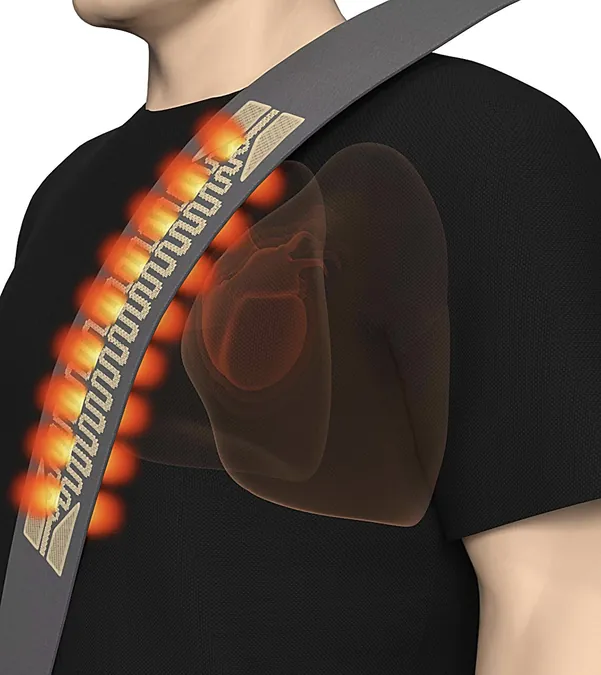
Revolutionizing Road Safety: The Remarkable Biosensor Integrated into Seatbelts to Monitor Driver Alertness and Stress
2024-11-17
Author: Jia
In recent decades, the fields of electronics and biomedical engineering have made significant advancements, particularly in the development of biosensors—innovative devices capable of detecting biological signals from users.
Traditionally, most of these sensors are incorporated into wearable or implantable technologies; however, their efficacy diminishes in environments with high movement, such as vehicles.
A breakthrough has emerged from researchers at the National University of Singapore and Tsinghua University. They have developed a cutting-edge biosensor that can monitor vital biological signals—like heartbeat and respiration—without direct contact with the body.
This remarkable invention, detailed in a paper published in Nature Electronics, opens new avenues for tracking cardiopulmonary functions in dynamic and confined spaces such as airplane cabins, moving cars, and buses.
“Monitoring drivers’ alertness or stress is essential for road safety,” said Xi Tian, a co-author of the study. Existing technologies struggle to accurately measure physiological indicators of fatigue due to the disturbances caused by vehicle vibrations.
The researchers aimed to address these challenges by creating a biosensor that can reliably function in such unpredictable environments.
The innovative biosensor utilizes metamaterials—specialized materials engineered to enhance particular properties. The team has cleverly embroidered conductive threads in a comb-shaped pattern onto a seatbelt, crafting a surface that optimizes the transmission of radio waves and enhances wireless communication with the human body.
"This design allows us to detect subtle physiological changes through clothing while minimizing interference from vibrations and other passengers," Tian explained.
The biosensor employs a sophisticated signal processing pipeline, which allows for continuous, precise monitoring of the driver’s heartbeat and respiration even while in transit.
The researchers conducted extensive testing of their biosensor in both an airline cabin simulator and a moving vehicle.
Results indicated that the seatbelt-integrated sensor perfectly adapted to users' bodies, successfully capturing minute cardiopulmonary signals despite movement.
“Our evaluations demonstrated that the biosensor performed consistently in a vehicle over a 1.5-hour trip in Singapore's varying traffic conditions,” Tian highlighted.
The implications of this research are staggering. The biosensor successfully detected physiological changes linked to sleep, providing a means for sleep-wake detection—an essential feature for ensuring alertness during long drives.
Looking ahead, the researchers plan to explore enhancements and test the biosensor in real-world scenarios.
The goal is to eventually incorporate this technology into the seatbelts of cars, airplanes, and other transportation modes, creating a proactive measure for monitoring drivers' physiological states and potentially reducing fatal accidents.
"Our future efforts will focus on miniaturizing the sensor's radio components for economical mass production,” added Tian.
“We also aim to develop algorithms that can analyze physiological data to evaluate fatigue levels, stress, and overall driver health. Collaborative efforts with automotive manufacturers are planned to further refine and validate the system.”
This groundbreaking work paves the way for a safer future on the roads, heralding a new era where technology actively aids in preventing accidents by monitoring the wellness of those behind the wheel.
As the researchers continue to innovate, the potential for transformative change in road and air safety becomes ever more apparent.

 Brasil (PT)
Brasil (PT)
 Canada (EN)
Canada (EN)
 Chile (ES)
Chile (ES)
 España (ES)
España (ES)
 France (FR)
France (FR)
 Hong Kong (EN)
Hong Kong (EN)
 Italia (IT)
Italia (IT)
 日本 (JA)
日本 (JA)
 Magyarország (HU)
Magyarország (HU)
 Norge (NO)
Norge (NO)
 Polska (PL)
Polska (PL)
 Schweiz (DE)
Schweiz (DE)
 Singapore (EN)
Singapore (EN)
 Sverige (SV)
Sverige (SV)
 Suomi (FI)
Suomi (FI)
 Türkiye (TR)
Türkiye (TR)